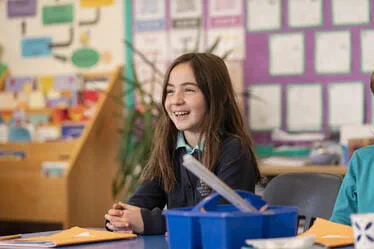The Value of Learning Life Skills Read what Mr. Wiseman has to say about the value of learning "soft skills," like collaboration, openness to learning and time management.
As we prepare to receive our children’s reports, we will be looking out for helpful commentary on our children’s academic development and success.
Our children’s learning, progress and attainment in the academic and cognitive area are critical. However, I am constantly reminded of the need to ensure that the emotional intelligence, values, spiritual and life skills components of education are not overlooked. These areas, however, are often less well documented in standard school reports.
This week, a report from the Boston-based education nonprofit ‘Transforming Education’ explored the impact that “soft skills” like self-control, openness to learning and collaboration have in a child’s future success in education and career. According to the report, the impact of these less quantifiable attributes can be significant, and can continue to affect a learner’s life for decades to come. These life skills not only make day-to-day life easier, they are associated with high school and college success, likelihood of future employment, higher earnings and positive health.
In 2008, Tony Wagner, working at Harvard University’s Innovation Lab, published ‘The Global Achievement Gap’. Wagner’s main goal was “to understand the new skills all students must master for learning, citizenship, and work in the twenty-first century”. The book’s subtitle is: “Why Even Our Best Schools Don’t Teach the New Survival Skills Our Children Need – and What We Can Do About It.”
Tony Wagner identified seven skills students will need to survive in the future. As Headmaster at BISB I find great encouragement in Wagner’s book; of the Seven Survival Skills for the 21st Century that he defined – the skills for work, learning and citizenship – I think our graduates at BISB tick every box.
Here they are:
- Critical Thinking and Problem Solving
- Collaboration Across Networks and Leading by Influence – global awareness, citizenship, languages
- Agility and Adaptability
- Initiative and Entrepreneurialism – creativity
- Effective Oral and Written Communication
- Accessing and Analyzing Information
- Curiosity and Imagination
In 2010, when the paperback version of ‘The Global Achievement Gap’ was published, Tony Wagner added an afterword in which he highlighted the International Baccalaureate Diploma Programme as “an excellent example of an international program that requires students to demonstrate mastery.” Wagner devotes three of his 18-page Afterword to the IBDP!
At BISB, we work hard to ensure our students graduate with the life skills they need to share their knowledge with the world through inspiring and successful careers. Teamwork and communication are practiced frequently in our Early Years and Lower School classes. Beginning in Middle School, our students take a skills course, which helps them develop strong time management, study and communication skills. As students move into the High School, they are given more responsibility over their learning, and gain key research and organizational skills. Our Work Experience program, completed at the end of Year 11, gives students real-world experience in a field of their interest, teaching professional skills and giving students a taste of a potential career.
This term, when you receive your child’s reports, I encourage you to talk with your child not only about the academic knowledge, skills and understanding they have gained, but about the other important skills they will need for a successful career and a happy, fulfilled life.








